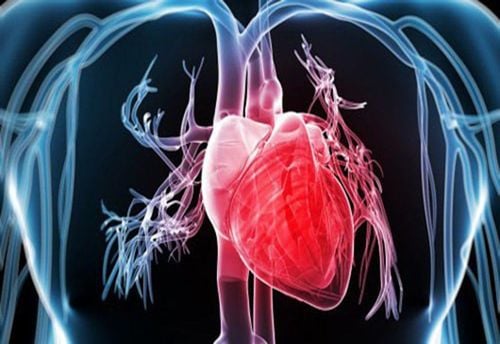This is an automatically translated article.
Currently obesity has become a public health problem in most countries. When obesity is linked to a number of health conditions such as diabetes, heart disease, stroke, gallbladder disease, even premature death. The cause of obesity is partly determined to be related to fast food.1. What is obesity?
Body mass index (BMI) is a calculation that takes into account a person's weight and height to measure body size. According to the Centers for Disease Control and Prevention (CDC), in adults, obesity is defined as having a BMI of 30.0 or higher.
Many studies have shown that obesity is associated with a higher risk of serious diseases, such as type 2 diabetes, heart disease and cancer.
Factors such as age, gender, ethnicity and muscle mass can affect the relationship between BMI and body fat. In addition, BMI does not distinguish between excess fat mass, muscle, or bone, nor does it provide any indication of fat distribution among individuals. Obesity is a complex disease associated with excess body fat.
There are many reasons why it is difficult for some people to avoid obesity. Typically, obesity is the result of a combination of genetic factors, combined with environment and individual diet and exercise.
Dietary changes, increased physical activity and behavioral changes can help you lose weight. Prescription medications and weight loss procedures are additional options for treating obesity.

Béo phì là nguyên nhân khiến chúng ta mắc nhiều căn bệnh
2. Causes of obesity
Ingesting more calories than the body burns during daily activity and exercise, can lead to obesity. Over time, calories will add up and cause weight gain.
In addition to the main cause coming from the amount of calories you take in and the amount of calories you burn out every day, the cause of obesity also comes from a number of factors that you cannot control, including:
Genetics, which can affect to how your body processes food into energy and how fat is stored. Being older, can lead to less muscle mass and a slower metabolic rate, making you more likely to gain weight. Not getting enough sleep can lead to hormonal changes that make you feel hungrier and crave certain high-calorie foods. Pregnancy, as the weight gained during pregnancy can be difficult to lose and can eventually lead to obesity.

Có rất nhiều nguyên nhân gây nên tình trạng béo phì ở cả nam và nữ
3. Fast food outside
Everyone knows that eating out or eating fast food can lead to excess calories and increase the risk of obesity. Because the serving size is too large and the energy density of the food increases. Fast food is usually:
High in calories High in fat High in saturated fat and trans fat High in sugar Rich in simple carbohydrates High in sodium (salt) Fast food and BMI:
Fast food has associated with higher body mass index, less sustained weight loss success, and weight gain. Fast food reduces the quality of the diet and provides unhealthy choices, especially in children and adolescents, increasing the risk of obesity. Fast food and childhood obesity:
Fast food affects children and young adults often worse than adults. This is because most fast foods are aimed at young people who like to maintain the habit of eating fast food and eating out. Children with excess energy imbalance persist for about 2% leading to obesity over time. Eating out is a major cause of obesity. Studies show that the calorie content of children's meals out is 55% higher than in meals at home.

Thường xuyên sử dụng đồ ăn nhanh sẽ làm gia tăng nguy cơ béo phì nhanh chóng
4. Eating out and health, the relationship with nutrient intake and obesity
An average of one-quarter of adults and one-fifth of children eat out at least once a week. Food eaten outside is an important part of our diet and can make a big contribution to calories (energy intake). Compared to meals prepared at home, people who eat out tend to have levels of:
Fat Saturated fat Added sugar Salt This means the choices you make when eating out can affect affect your health.
The increase in out-of-home meals, especially options that are high in fat, salt and sugar has been shown to be an important factor contributing to increased levels of overweight and obesity.
One-third of children aged 6 (10-11 years) and about two-thirds of adults are overweight or obese. So being aware of how many calories we are consuming is very important.
5. How does obesity affect health?
5.1. Hypertension Obesity is a major risk factor for high blood pressure (also known as hypertension.About 3 out of 4 cases of high blood pressure are linked to obesity.High blood pressure increases the risk. suffer from other diseases, including coronary heart disease, congestive heart failure, stroke, and kidney disease
5.2 Heart disease Obesity is a major risk factor for heart disease. being severely obese have a higher risk of coronary heart disease This means they have a higher risk of having a heart attack
Obesity also increases the risk of heart failure Severe obesity is linked to heart rate irregular heart rhythms (arrhythmias) These arrhythmias can triple the risk of cardiac arrest.However, some excess weight may protect against death from heart failure, once diagnosed. perform.

Béo phì là một yếu tố nguy cơ chính của bệnh cao huyết áp (còn được gọi là tăng huyết áp)
5.3. Respiratory disorders Obese people have reduced lung capacity. These people are at a higher risk of respiratory infections. They are more likely to have asthma and other breathing disorders. Asthma has been shown to be 3 to 4 times more common in people with obesity.
More than half of people, affected by obesity (about 50-60%) have sleep apnea (OSA). In the case of severe obesity, this figure is about 90%. OSA is a very serious breathing disorder. OSA occurs when excess fat in the neck, throat, and tongue blocks the airways during sleep. This blockage causes apnea, which means a person stops breathing for a while. A person with OSA can have hundreds of episodes of apnea each night. Apnea episodes reduce the amount of oxygen in a person's blood.
OSA can lead to high blood pressure, pulmonary hypertension, and heart failure. OSA can cause sudden cardiac death and stroke. Because episodes of apnea disrupt the normal sleep cycle, you may not be able to achieve restful sleep. This can lead to fatigue and drowsiness. If left untreated, this sleepiness can increase the risk of a motor vehicle accident.
Although overweight and obesity cause many great health effects, but we can completely prevent it by choosing healthy, low-fat foods, minimizing food. Eat fast and exercise regularly.
However, if in case you are determined to be severely obese and have genetic factors, you can go to Vinmec International General Hospital to listen, consult and treat diseases as well as improve your health. A nutritional plan suitable for all ages according to their individual needs.
Please dial HOTLINE for more information or register for an appointment HERE. Download MyVinmec app to make appointments faster and to manage your bookings easily.
Reference source: nutrition.org.uk













